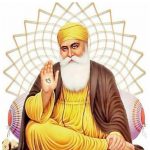Swami Dipankar and the Bhiksha Yatra Movement: Uniting Hindus and Abolishing Caste in North India
In the heartland of North India, where the echoes of history blend seamlessly with the complexities of the present, a spiritual luminary and social reformer named Swami Dipankar has embarked on a transformative journey. He has pioneered a movement known as the “Bhiksha Yatra” to eliminate the deeply rooted caste divisions and foster a collective Hindu identity. Swami Dipankar’s tireless efforts have ignited a beacon of hope, challenging age-old social norms and striving to create a more inclusive and united Hindu identity.

Early Life and Spiritual Awakening
Swami Dipankar’s journey began in a small village in North India, where he displayed a profound inclination towards spirituality from an early age. His unwavering dedication to the Hindu faith and a series of profound spiritual experiences set him on a path that would eventually lead him to a prominent role in the religious and social landscape of the region.
The Bhiksha Yatra Movement: A Quest for Unity
Central to Swami Dipankar’s mission is the Bhiksha Yatra, a unique movement that encompasses a blend of spirituality, social reform, and an unwavering commitment to the principles of Hinduism. Bhiksha Yatra is an ancient tradition where wandering monks embark on a journey, living on alms and spreading spiritual teachings. Swami Dipankar, in a modern reinterpretation of this tradition, embarked on a Bhiksha Yatra to abolish caste distinctions and unify Hindus.

The Bhiksha Yatra movement has two fundamental components:
Abolishing Caste: At the core of Swami Dipankar’s mission is the dismantling of the divisive caste system. He firmly believes that the essence of Hinduism lies in its inclusivity and unity, transcending rigid hierarchical divisions. Through the Bhiksha Yatra, he emphasizes that every Hindu, regardless of their caste, is an integral part of the same spiritual and cultural tapestry.
Fostering Hindu Identity: The Bhiksha Yatra serves as a powerful symbol of unity. Swami Dipankar’s journey, wherein he accepts alms from individuals of all castes, embodies the essence of Hinduism as a collective identity, transcending the limitations of caste. By living a life free of material possessions and caste distinctions, he inspires Hindus to connect on a deeper level as a united community.

Challenges and Triumphs
Swami Dipankar’s path has not been without its share of challenges. The deeply entrenched interests of those who benefit from the caste system, as well as conservative elements within society, have posed significant obstacles. Yet, his unwavering commitment and moral authority have helped him overcome these challenges, gaining the trust and support of many.

Legacy and Impact
Swami Dipankar’s Bhiksha Yatra movement has left an indelible mark on North India. While the caste system has not been completely eradicated, his work has laid the foundation for social reform, and his followers continue to carry forward his mission. The Bhiksha Yatra, as a symbol of unity and inclusivity, continues to inspire Hindus across the region to connect on a spiritual level, disregarding the divisive constraints of caste.
In conclusion, Swami Dipankar and the Bhiksha Yatra movement stand as a testament to the transformative power of one individual’s commitment to a noble cause. His mission to abolish the caste system and promote a common Hindu identity in North India offers hope for a more harmonious future. In a diverse country like India, his visionary approach demonstrates the potential for building a more inclusive and united society grounded in the principles of Hinduism. Swami Dipankar’s legacy is an inspiration for all who seek to eliminate caste-based discrimination and foster unity within the Hindu community.
Bhavya Sri
Religion World
www.religionworld.in









